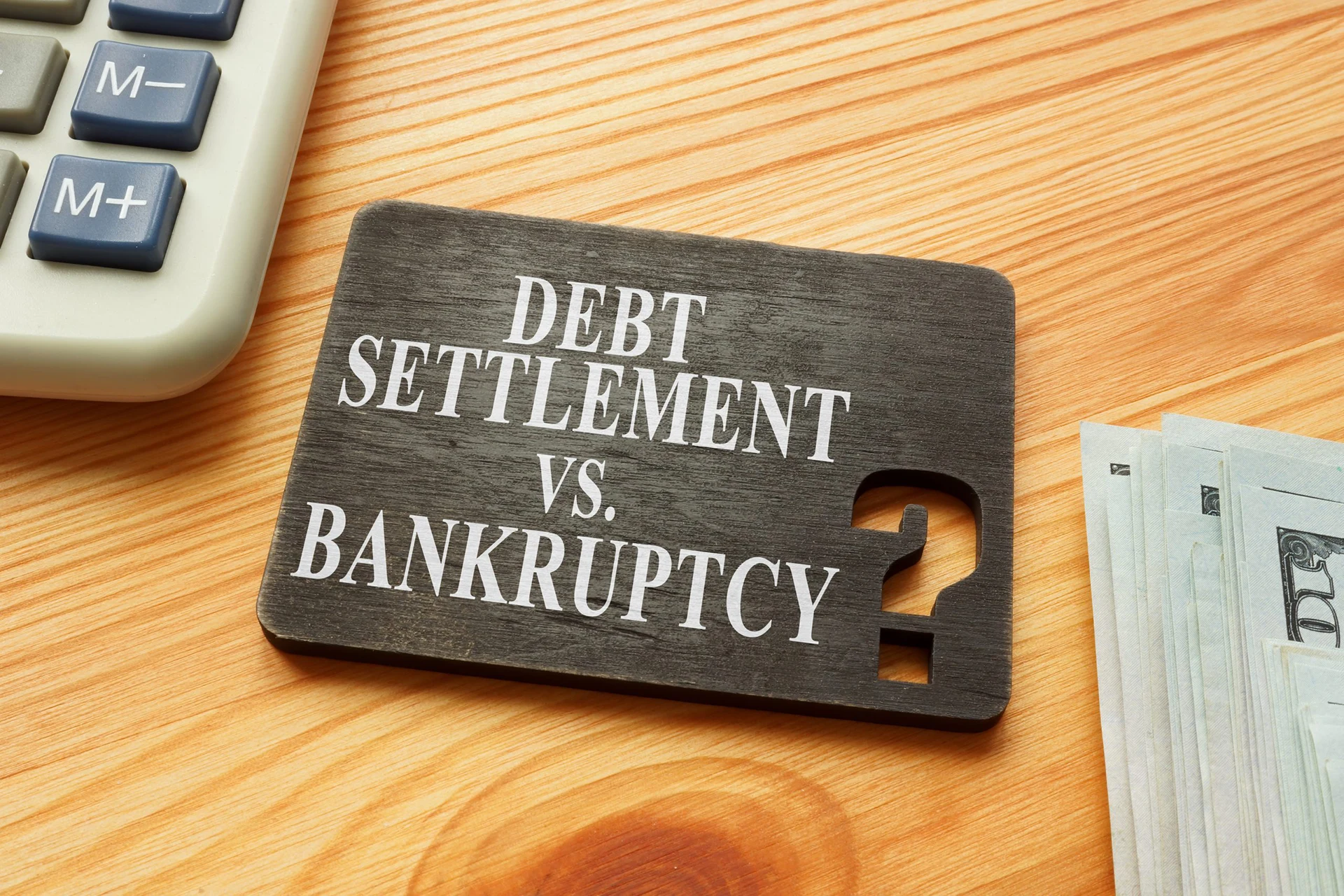Debt Settlement vs. Bankruptcy—Pros And Cons

Filing for bankruptcy can often seem like the easier way out of unpayable debt.
However, it has severe, long-term effects that are almost impossible to correct.
Debt settlement, on the other hand, can be a more optimal solution for many—read on to find out the pros and cons of each option.
*** SPECIAL NOTE *** – If your credit cards, personal loans, or medical debts have become unmanageable and you owe over $20,000… then go here for debt relief. We can help!
Debt Settlement vs. Bankruptcy
First, let’s briefly touch on each term to fully understand what they stand for.
Bankruptcy is a legal proceeding carried out to allow individuals or businesses freedom from their debts, while simultaneously providing creditors an opportunity for repayment. While fully freeing a person, or entity from debt, bankruptcy leaves a mark on records that is close to indelible, even many years after the occasion.
Debt settlement, on the other hand, is essentially a course of negotiations done by professionals on behalf of a client with their creditors to partially relieve the owed amount at hand. While the outcome may vary, the relieved debt can reach up to half of the total outstanding balance.
Now that everyone’s on the same page, let’s look at which solution you should actually choose.
Bankruptcy: Pros And Cons
When it comes to filing for bankruptcy, a definite advantage is that it deletes almost all related outstanding debt, except government obligations, student loans, and child support and alimony obligations.
That is, of course, if you file for liquidation bankruptcy under Chapter 7 of the U.S. Bankruptcy Code. This type is one of the most common of all for most individuals, along with Chapter 13’s repayment plan.
Chapter 7 liquidation is definitely the quicker option, as the process usually takes only around half a year at most, and both individuals and businesses can file for it. However, don’t be blinded by the way this sounds.
Naturally, to discourage everyone from doing so, the event has one of the worst effects on financial status for up to 10 years after it’s finalized, making it extremely hard to qualify for any kind of credit thereafter. Also, all assets that fulfill certain criteria will be sold to lower the debt first.
With all that said, it could still be a viable solution for those who simply cannot afford to make further payments at all.
A repayment plan under Chapter 13 could be an alternative for some.
This type does not forgive outstanding debt, but rather establishes a new payment schedule for your debts, distributed throughout the upcoming three to five years.
It does take longer than liquidation, however, it “only” stays on your report for seven years, and it can even fully stop an ongoing foreclosure, without the bankrupt person or business having to sell any assets.
Debt Settlement: Pros And Cons
Serving as a sort of middle way, debt settlement’s benefit is that it combines the great characteristics of bankruptcy with possibly reduced long-term effects.
The effects of debt settlement can stay on credit reports for up to seven years, and just like bankruptcy, it will negatively affect your credit score—however, its impact can be lowered in certain cases.
Interestingly enough, the lower your credit score before beginning a debt settlement program, the lower its effects will be, and vice versa.
How it typically works is professionals trained for such negotiations approach the clients’ creditors, and reach an agreement, which usually relieves a significant portion of the owed amount.
Nevertheless, a disadvantage can be that the full balance is rarely forgiven, hence the client will have to repay some of their debt.
Final Thoughts About Debt Settlement vs. Bankruptcy
If you’re struggling with your credit card or any unsecured debt, evaluating your options is never a bad idea.
At Americor, we understand the unique financial challenges people are facing today.
As America’s trusted source for debt relief solutions, we aim to empower you with financial knowledge that can lead to informed decisions, whether it’s about savings, investments, or managing debt.
If your debt has become unmanageable and you have difficulty making your debt payments each month, then you should consider a FREE consultation call with one of our certified Debt Consultants, who can provide personalized debt relief advice tailored to your specific needs.
By taking proactive steps today, you can put an end to your financial stress and work towards a brighter financial future.
Remember, there is always hope for debt relief, and our team of experienced professionals are ready to guide you on your journey to regaining control of your finances.
For more information on Americor’s debt relief services, contact us today to see how we can help you eliminate your debts, and get on the fast-track to becoming completely debt-free!